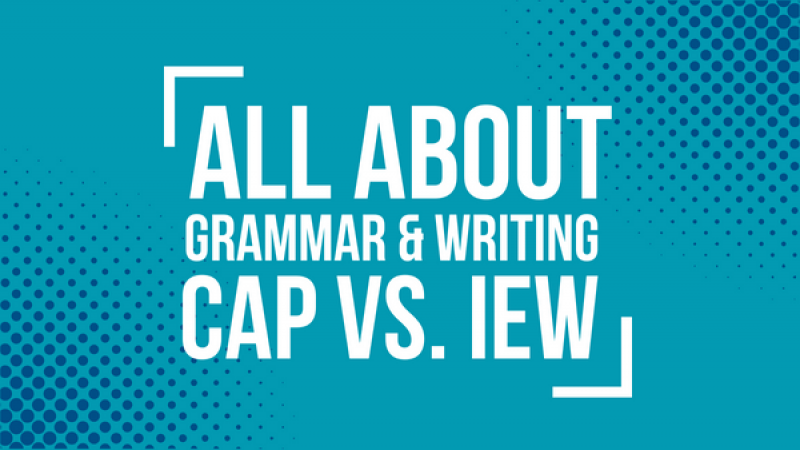Classical Academic Press Grammar vs. IEW Grammar

Wondering what the difference between Classical Academic Press and Institute for Excellence in Writing course covers and if it’s right for your student? Watch this video to hear directly from Mrs. Southern, VSA Teacher.
Episode Transcription
Note: This transcription may vary from the words used in the original episode for better readability.
I do teach both Grammar and Writing 5 IEW Shurley and Shurley IEW Grammar and Writing 6, as well as the two new course offerings of Grammar and Writing that have offered this year using we call it CAP, which is Classical Academic Press. That's just an acronym for the publisher of the curriculum. And it is a combined grammar– and we have a grammar, a book, and a writing book, but they're both by the same publisher.
So I was going to give you just a few pointers and a few things on what is CAP and what are some of the similarities and differences. So there's a few of my notes here. As you can see that the CAP program, the Grammar is called the Well-Ordered Language. And right now we use four of their books throughout the Grammar program as well as– I guess we actually use eight because there's two books per year, and then it’s a systematic and sequential Grammar skills that is similar to what we do in Shurley through repetition and memorization. We also will be analyzing and something that is unique to the Well Ordered Language and the CAP program is we diagram. Diagraming: we don't do that in the Shurley program, but we analyze, we do analyze in Shurley. But within the Well Ordered Language, we will be diagraming from after our and analyzing the different parts of speech. And of course, we love to use our memorize and use our jingles as those will help solidify the elements and using those with some fun chants and with our jingles, as well as essential elements through the activity pages, through the workbook. So it's a Grammar book, and it's also a workbook all in one.
And this year has been it's been, of course, the piloting year for both CAP 5 and CAP 6 as well as the Level 3 and Level 4. Rebecca Jacoby is actually the teacher of those two courses, the three and four. And she and I have worked so, and we have coincided as we have together built this program for our presentation here at Veritas.
And through this there is a lot of interactive games we use through listening and speaking as well as we will be using example models with poems and literary excerpts. And that's CAP will be using that. And that's some of their strong points of how they teach their Grammar.
Now, students coming in, this is not going to be an easier option necessarily, but it's not going to be a difficult option and more difficult option. It's just going to depend on the strength and that of how your child likes to learn. And so it's not necessarily easier, but it's just a different presentation as Mrs. Weaver has already stated. But it should be– CAP would might seem to be more manageable and preferable for those different learning styles as it just has a different presentation in the way that we learn Grammar.
A noun is still a noun, and adjectives are still additive all the way. Now let's talk about the writing program.
So in the IEW, I have used the IEW program in my own homeschool for this is. I would say this is my 16th year now of using the IEW Writing program, and well it has Writing skills that will use to retell and imitate, and to innovate in different type– by using different types of writing. But the Style and Structure, it also uses the checklists in all their writing assignments. And that's some of the big, that's some of the key components to the program that Mr. Pudewa has created in the Institute for Excellence in Writing. And so it's very structured, and it's very structured and has a very structured and style technique approach to it.
Now looking at the CAP, the Classical Academic Press, the Writing Rhetoric, it is going to be a lot stronger than using the sense of that. You'll see, you might see throughout if you do any research on your own, you're going to see this, but this big word [unclear], and it's going to use it's don't let that word scare you or anything like that.
It is going to prepare students for rhetoric, which is the art of writing well and speaking persuasively. And so the CAP writing that is taught is working through exemplary models like the Charlotte Mason method, which uses the rich living models and will give narrative using narratives and expository descriptive persuasives while development and integrated public speaking is practiced as well.
And so before book one of the Writing in Rhetoric as well as now, I'm going to talk about both of them. The students should be able to identify and write a complete sentence and that would be in the third and fourth grades. So before the book that we use in third and fourth grade, and – don't coordinate the than the letter number of the book to the actual grade because that's going to be a little different.
And so, the foundational skills that are built by this book are given in bite-sized pieces that are manageable and doable, and workable for the child.







